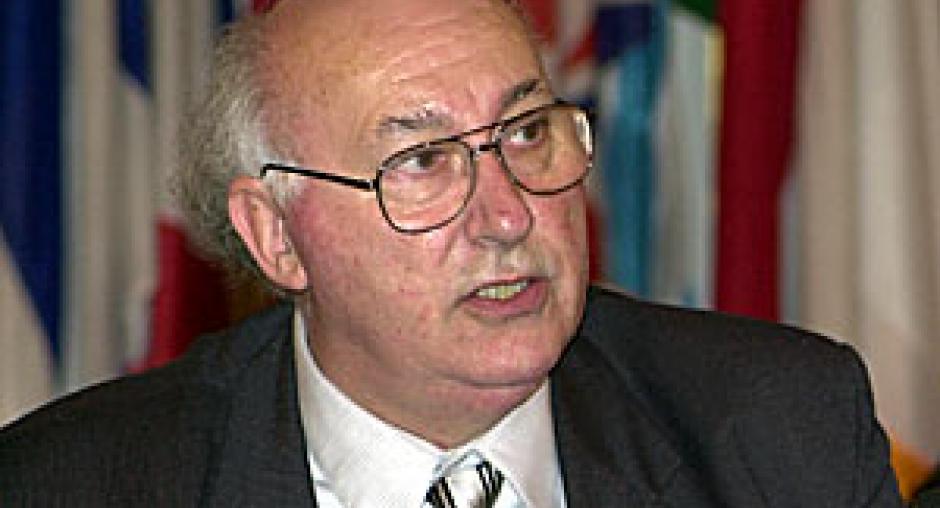Newsroom
OSCE Parliamentary Assembly President calls on OSCE to reassert its role in enlarging Europe
VIENNA 3 September 2003

(Alexander Nitzsche/OSCE)President of the OSCE Parliamentary Assembly Bruce George
addressing the 55-nation Permanent Council, 5 September 2002. (Alexander Nitzsche/OSCE) Photo details
VIENNA, 3 September 2003 - The President of the OSCE's Parliamentary Assembly, Bruce George, today called upon the OSCE to reassert its importance in the face of the enlargement process of the European Union and NATO.
"The OSCE must define its objectives in a changing Europe," he told the OSCE Permanent Council in Vienna.
"The enlargement of both the EU and NATO cannot remain without significant consequences for other organizations. We must remember that the OSCE remains the most flexible and responsive Euro-Atlantic foreign policy instrument for non-military contingencies".
"The OSCE's comprehensive approach to security, emphasizing human rights and economic development as well as military security issues, places it in a unique position in this new European security architecture," he added.
Mr George said the 55-nation OSCE had the capacity to deal with both intra-state conflict and trans-national threats to stability. Its broad Euro-Atlantic and Euro-Asian composition were unique assets to the OSCE area, he said.
"The OSCE participating States have a common stake in the security of Europe and should therefore co-operate to prevent crises from happening and to reduce the risk of already existing crises becoming worse."
Mr George reported on the Rotterdam Declaration adopted by the more than 300 OSCE parliamentarians on 9 July 2003, which stated that the real strength of the OSCE lay both in its capacity to respond to security threats and challenges and its strong field presence.
The Declaration also recommended fostering the role of the OSCE in unarmed peacekeeping operations and urged the Organization to build up appropriate capacity in the area of border management and border security.
Mr George pledged the active support of the OSCE Parliamentary Assembly as "a reliable partner in the OSCE which continues to make a positive contribution to its further development and to the achievement of its noble goals."
"The OSCE must define its objectives in a changing Europe," he told the OSCE Permanent Council in Vienna.
"The enlargement of both the EU and NATO cannot remain without significant consequences for other organizations. We must remember that the OSCE remains the most flexible and responsive Euro-Atlantic foreign policy instrument for non-military contingencies".
"The OSCE's comprehensive approach to security, emphasizing human rights and economic development as well as military security issues, places it in a unique position in this new European security architecture," he added.
Mr George said the 55-nation OSCE had the capacity to deal with both intra-state conflict and trans-national threats to stability. Its broad Euro-Atlantic and Euro-Asian composition were unique assets to the OSCE area, he said.
"The OSCE participating States have a common stake in the security of Europe and should therefore co-operate to prevent crises from happening and to reduce the risk of already existing crises becoming worse."
Mr George reported on the Rotterdam Declaration adopted by the more than 300 OSCE parliamentarians on 9 July 2003, which stated that the real strength of the OSCE lay both in its capacity to respond to security threats and challenges and its strong field presence.
The Declaration also recommended fostering the role of the OSCE in unarmed peacekeeping operations and urged the Organization to build up appropriate capacity in the area of border management and border security.
Mr George pledged the active support of the OSCE Parliamentary Assembly as "a reliable partner in the OSCE which continues to make a positive contribution to its further development and to the achievement of its noble goals."
